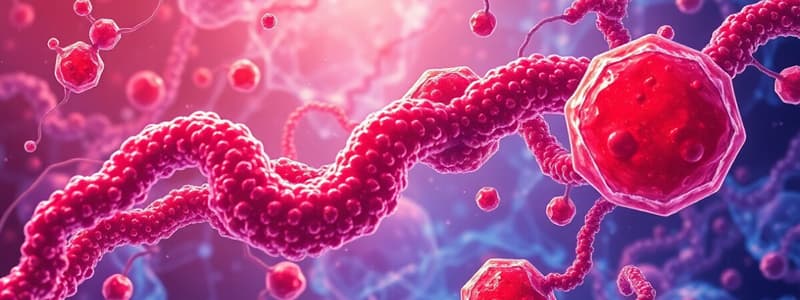Podcast
Questions and Answers
What is the primary source of glucose in the human body?
What is the primary source of glucose in the human body?
- Carbohydrates (correct)
- Proteins
- Nucleic Acids
- Fats
Which hormone is responsible for increasing blood glucose levels by releasing stored glucose in the liver?
Which hormone is responsible for increasing blood glucose levels by releasing stored glucose in the liver?
- Insulin
- Glucagon (correct)
- Cortisol
- Epinephrine
Which metabolic process involves the conversion of glucose to glycogen for storage?
Which metabolic process involves the conversion of glucose to glycogen for storage?
- Glycogenesis (correct)
- Glycogenolysis
- Glycolysis
- Gluconeogenesis
What is the defined fasting blood glucose reference range in adults?
What is the defined fasting blood glucose reference range in adults?
Which glucose testing method is characterized as highly specific and unaffected by ascorbic acid?
Which glucose testing method is characterized as highly specific and unaffected by ascorbic acid?
What is the main limitation of using C-peptide levels as an indicator of beta-cell function?
What is the main limitation of using C-peptide levels as an indicator of beta-cell function?
Which of the following conditions would likely lead to a lactate to pyruvate ratio below 25:1?
Which of the following conditions would likely lead to a lactate to pyruvate ratio below 25:1?
In which situation would a point-of-care glucose reading likely be falsely elevated?
In which situation would a point-of-care glucose reading likely be falsely elevated?
What is the primary ketone body detected by the nitroprusside reaction during testing?
What is the primary ketone body detected by the nitroprusside reaction during testing?
What is indicated when microalbumin levels in urine are within the normal range?
What is indicated when microalbumin levels in urine are within the normal range?
Flashcards are hidden until you start studying
Study Notes
Glucose Metabolism
- Sources: Glucose primarily originates from carbohydrate intake.
- Storage Forms:
- Glycogen: Stored in the liver for short-term energy needs.
- Triglycerides: Stored in fat tissue for long-term energy reserves.
- Metabolic Processes:
- Glycolysis: The breakdown of glucose to pyruvate or lactate, producing energy.
- Gluconeogenesis: The formation of glucose-6-phosphate from non-carbohydrate sources.
- Glycogenolysis: The breakdown of glycogen to glucose for energy.
- Glycogenesis: The conversion of glucose to glycogen for storage.
- Lipolysis: The breakdown of fat.
- Lipogenesis: The conversion of carbohydrates to fatty acids.
Blood Glucose Regulation
- Insulin:
- Produced by beta-cells in the pancreas.
- Facilitates glucose uptake into cells, decreasing blood glucose levels.
- Glucagon:
- Released by the pancreas.
- Stimulates glycogenolysis in the liver, increasing blood glucose levels.
- Epinephrine:
- Released by the adrenal glands.
- Promotes glycogenolysis in the liver and muscle tissues, increasing blood glucose levels.
- Also triggers the "fight-or-flight" response, increasing heart rate and constricting blood vessels.
- Cortisol:
- Released by the adrenal cortex.
- Promotes protein and fat breakdown.
Hypoglycemia
- Abnormally low blood glucose levels.
- Caused by medications, alcoholism, and certain conditions associated with diabetes.
- Infants may not display symptoms.
Diabetes Overview
- Type 1 Diabetes:
- Characterized by absolute insulin deficiency due to beta-cell destruction.
- Typically diagnosed before age 30.
- Leads to rapid hyperglycemia.
- Type 2 Diabetes:
- Accounts for 90% of diabetes cases.
- Associated with obesity and insulin resistance or decreased production.
- Gestational Diabetes:
- Develops during pregnancy.
- Diagnosed through testing between 24-48 weeks of gestation using a glucose load.
Glucose Reference Ranges
- Adults:
- Fasting: 74-100 mg/dL (Serum), 65-95 mg/dL (Whole Blood)
- Postprandial (After Meals): 126 mg/dL
- Random/Oral: >200 mg/dL
- HbA1c: >6.5%
- Gestational Diabetes Diagnosis:
- Fasting: >92 mg/dL
- 1-hour postprandial: >180 mg/dL
- 2-hour postprandial: >153 mg/dL
Glucose Testing Methods
- Hexokinase:
- Highly specific test.
- Converts glucose to glucose-6-phosphate, measuring reduced NADP.
- Unaffected by ascorbic acid.
- Glucose-Oxidase Reaction:
- Less specific than the hexokinase method.
- Oxidizes glucose to produce gluconic acid and hydrogen peroxide, forming a measurable colored compound.
- Affected by ascorbic acid.
- Point-Of-Care Testing:
- Utilizes whole blood.
- Readings are typically 10-15% lower than plasma/serum readings.
- Low hematocrit falsely increases glucose; high hematocrit falsely decreases glucose.
C-Peptide
- Not routinely tested but provides a better indicator of beta-cell function than insulin levels.
- C-peptide levels are reduced by exogenous insulin, which suppresses beta-cell function.
Ketone Bodies
- Acids produced by the body when it utilizes fat for energy instead of carbohydrates (ketosis).
- Diabetic Ketoacidosis: Lack of insulin leads to excessive ketone production.
- Testing:
- Nitroprusside reaction primarily detects acetoacetate, with less sensitivity to acetone and none to B-hydroxybutyrate.
Lactate/Pyruvate
- Pyruvate is oxidized to lactate dehydrogenase with NAD in anaerobic conditions.
- Lactate Pyruvate Ratio:
- Increased Lactate: A ratio of over 35:1 may indicate hypoxia (lack of oxygen).
- Increased Pyruvate: A ratio of under 25:1 may indicate a defect in gluconeogenesis or myocardial ischemia.
Sample Collection
- Sample Collection: Collect from a resting patient using a gray top tube; avoid using a tourniquet during collection.
Microalbumin
- Low levels of albumin in urine.
- Elevated levels can indicate diabetic nephropathy (kidney damage).
- Collected in timed urine samples or first morning specimens.
- Normal Range: <30 mg/g creatinine.
Studying That Suits You
Use AI to generate personalized quizzes and flashcards to suit your learning preferences.




